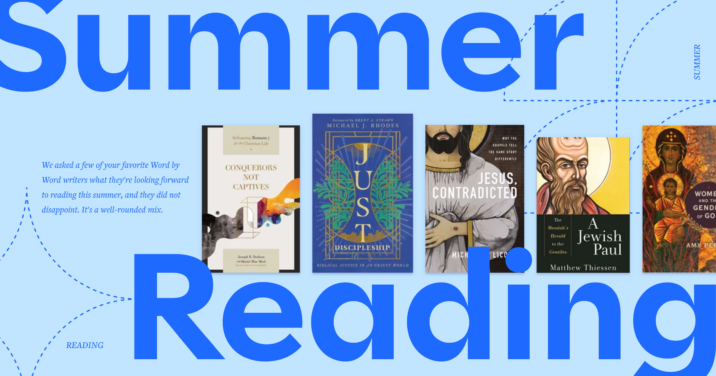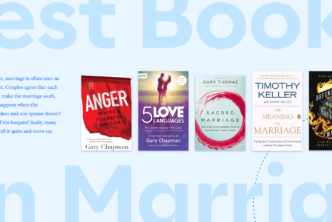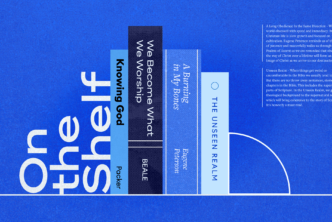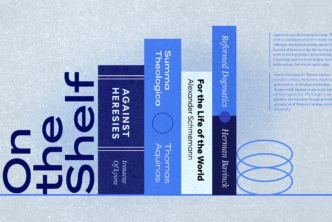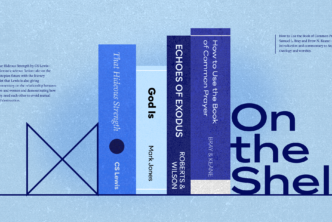We asked a few of your favorite Word by Word writers what they’re looking forward to reading this summer, and they did not disappoint. It’s a well-rounded mix.
We debated only sharing the items we carry in our store, but the fact that our writers read broadly is part of what makes them so great at what they do. So we’ve hyperlinked the resources we currently carry at Logos, and we’ve passed the other titles along to our team try to add in the future. Enjoy!
Table of contents
Michael F. Bird
Michael F. Bird (PhD, University of Queensland) is deputy principal at Ridley College, Melbourne, Australia. He is an Anglican priest and the author of over thirty books about the New Testament and theology.
1. Stasiland: Stories from Behind the Berlin Wall, by Anna Funder
A book about the East German security state. I’m reading it because I’m interested in political authoritarianism.
2. Remaking the World: How 1776 Created the Post-Christian West, by Andrew Wilson
A book how about things that happened in 1776 helped create the post-Christian West.
3. A Jewish Paul: The Messiah’s Herald to the Gentiles, by Matthew Thiessen
The latest book about Paul within Judaism.
4. The Verge: Reformation, Renaissance, and Forty Years that Shook the World, by Patrick Wyman
A book about the years that made the Reformation, and that made the Reformation so impactful.
5. Why Evangelical Theology Needs the Global Church, by Stephen T. Pardue
A book about the importance of listening to global voices in theology.
6. What Is a Gospel?, by Francis Watson
A book that challenges us to think about “gospel” outside the normal canonical categories by looking at “other” gospels.
7. God and Christ in Irenaeus, by Anthony Briggman
A book about Ireaneus’s doctrine of God and Christ and the relationship between the two.
Wyatt Graham
Wyatt Graham is the executive director of The Gospel Coalition Canada and teaches at various institutions of higher learning. See Wyatt Graham’s top 10 books.
1. The Guide for the Perplexed: A New Translation, by Moses Maimonides (trans. Lenn E. Goodman and Phillip I. Lieberman)
With a new translation and commentary by Goodman and Lieberman, this seems like a great time to dive into one of the medieval classics. I am reading it to understand Jewish biblical and philosophical thinking during the twelfth century.
2. The Theory and Practice of Virtue, by Gilbert C. Meilaender
Why? Because I believe we need to become the kind of people who can act morally in a world of increasing complexity. We cannot just learn rules or follow duty when technology and its moral implications change every week. We can’t keep up. So we need to virtue up.
3. What Is Islam? The Importance of Being Islamic, by Shahab Ahmed
I want to read this to understand Islam.
4. The Word Made Flesh for Us: A Treatise on Christology and the Sacraments from Hooker’s Law, by Richard Hooker
Hooker is a theological giant, and his irenic reformational writing seems a model for imitation.
5. The North American High Tory Tradition, by Ron Dart
Well, I need to finish this book finally. I am Tory, and Dart is my guy. So I need to read it!
6. J. R. R. Tolkien: Christian Maker of Middle-Earth, by Jeremy W. Johnston
My friend wrote this biography of Tolkien. I love The Lord of the Rings. It’s an easy go-ahead to read!
7. A World after Liberalism: Philosophers of the Radical Right, by Matthew Rose
We live in a society where many think liberalism has failed. So radical right thinkers are vying for political power. I am part way through the book already, and it’s a helpful guide to our new world of politics.
Scott Harrower
Rev. Dr. Scott Harrower is a former nurse who teaches theology and mental health at Ridley College in Melbourne, Australia. He has authored multiple books on how Christians may recover from trauma, and teaches regularly on these topics.
1. Mirror of Charity, by Aelred of Rievaulx
I am reading it because in this work the author explains how love allows us to rest in Jesus as we develop new attachments to him.
2. Song of Songs
I am reading it as an allegory of God’s love for his people.
3. Psalms
I am preparing a course on mental health, and the Psalms will be vital for that course.
4. The Confessions, by St. Augustine
This is one of my favorite end-of-semester go-to books.
JoAnna Hoyt
JoAnna M. Hoyt is an associate professor at Dallas International University. She is the author of the Amos, Jonah & Micah volume of the Evangelical Exegetical Commentary (EEC) series and the assistant Old Testament editor for the series.
1. The Forgotten Desert Mothers, by Laura Swan
I’m in the process of filling in the gaps left from all my church history classes and their lack of inclusion of the women of the church.
2. Delighting in the Trinity: An Introduction to the Christian Faith, by Michael Reeves
This book has been on my “to read” list for a while. But when I heard several students talking passionately about how much they loved it, it moved to the top of my list. I love recommendations from students.
3. Just Discipleship: Biblical Justice in an Unjust World, by Michael Rhodes
I’m seeking to broaden and deepen my theology of justice, and from the reviews it sounds like this book works on developing just this. Rhodes does so in a way that draws direct practical implications to how we should live out justice in our lives in the church today. I’m glad to see someone making such direct connection to the implications for today’s world.
4. From Isolation to Community: A Renewed Vision for Christian Life Together, by Myles Werntz
The church constantly needs to push back against cultural individualism, but it often fails to do so with a healthy theology of community. From the reviews, it sounds like Werntz has created a great resources that helps build that healthy theology, as it builds on Bonhoeffer’s prior work on community.
5. Women and the Gender of God, by Amy Peeler
This book has been on my “to read” list since it came out, but I’ve lacked the focused reading time I want to give it. I’m eager to learn from her about the theology of God and gender.
6. How Emotions Are Made: The Secret Life of the Brain, by Lisa Barrett
The church lacks a healthy theology of emotions. While this book does not address theology, I’m looking forward to understanding more about emotions so I can work on helping the church develop a healthy theology of emotions.
7. The Beauty of Preaching: God’s Glory in Christian Proclamation, by Michael Pasquarello III
This book was a random purchase; the title caught my attention. I don’t know what to expect from the book—I am simply hoping to see and understand more about the beauty of preaching.
Christopher D. Kou
Christopher holds a certificate in biblical, liturgical, and cultural studies from Theopolis Institute. He has been published in the Journal of the Evangelical Theological Society (JETS). He is currently enrolled in the MABS program at Reformed Theological Seminary and holds a bachelor’s in history and theology from Elmhurst University. Christopher lives in the northwest suburbs of Chicago, Illinois, with his wife, Ellyn, and their two children, Stephen and Eliana. He is a member of Christ Covenant Church of Chicago (CREC).
1. Ruled Reading and Biblical Criticism, by Matthew T. Bell
I am fascinated with the pushback in recent years against the chronological snobbery evident in modern biblical criticism, which discounts any pre-critical approach to hermeneutics. Though I think that modern critical methods have some things to contribute, I feel they have also largely led us astray. I am interested in reading Bell’s analysis of how more recent “theological interpretation” and “canonical interpretation” approaches answer the questions and challenges of critical methods.
2. Hell Shall Not Prevail: Essays on Ecclesiocentric Postliberalism, by Andrew K. Bobo, James R. Rogers, Peter J. Leithart, et al.
This is Theopolis Institute’s answer to the question of “Christian Nationalism.” The Civitas group has been exploring ecclesiocentric political thought in the past year or so in podcasts, and this is their first book: a collection of essays laying the intellectual foundations of the project. Since I am committed to a church that must remain relevant in the world today, I am interested in learning more about what undergirds this new approach to political theology.
3. Cursing with God: The Imprecatory Psalms and the Ethics of Christian Prayer, by Trevor Laurence
I met Trevor at ETS when he gave a brilliant presentation on the golden calf incident of Exodus 32. This is Trevor Laurence’s doctoral dissertation, which is to this point the sole recipient of the James B. Jordan Prize for outstanding contributions to the field of biblical theology. This work argues for the continued relevance and use of the so-called psalms of imprecation in Christian worship and devotion. This is a topic that is sensitive even for the most conservative of Christians, who don’t know what to do with these psalms and wonder if they come off as simply mean-spirited. I am looking forward to digging into Trevor’s approach.
4. The Iliad, by Homer (trans. Peter Green)
It’s a classic epic and a monument of storytelling, obviously. However, I have also come to appreciate the interplay of Greek mythological themes and biblical backgrounds. Dr. Warren Gage goes so far as to suggest that Homer’s heroes are planted by divine inspiration to prepare the Hellenic world to receive the gospel of Jesus Christ. Peter Green’s translation preserves, as much as possible, the poetic rhythm (dactylic hexameter) of the classical Greek, so I’m looking forward to perusing it. (Editor’s note: We don’t carry the Green translation, so we’ve linked to another.)
5. If Adam Had Not Sinned: The Reason for the Incarnation from Anselm to Scotus, by Justus H. Hunter
Another work exploring the theme of “incarnation anyway,” or supralapsarian Christology, which argues that the incarnation of the Son was the intent from the moment of Adam’s creation (or before it). It is not a mere remedy to humanity’s sin, but is integral to what it means for us to be the image of God. This book explores the theme in historical theology from Anselm to Scotus, something I have not studied in depth.
Ryan Lytton
Ryan Lytton is assistant professor and director of academic services at Life Pacific University-Virginia. He earned a bachelor’s degree in biblical studies from Life Pacific University where he graduated in 2007. From there he went on to complete a master of arts in Christian thought from Gordon-Conwell Theological Seminary, where he focused on how the Bible was interpreted in the patristic period (AD 100–800). He’s currently pursuing a PhD through Southeastern Baptist Theological Seminary, continuing his study of patristic exegesis.
1. Autism & Worship: A Liturgical Theology, by Armand Léon van Ommen
I’m writing a book review on this for Society of Pentecostal Studies. My interest in this book was sparked because my son is autistic and that has presented unique challenges for my family as we attend church. Bright lights, loud music, abrupt changes. These are things I’ve never thought about before, but now they are always on my mind when we visit a church. I’ve only read a little of this book so far, and it has already proved well worth the time.
2. Jesus Contradicted: Why the Gospels Tell the Same Story Differently, by Michael R. Licona
I’ve taught Synoptic Gospels now for over a decade, and one of the perennial questions in that course is how to understand Gospel differences. I’ve long leaned on Dr. Licona’s work in explaining this topic to them, and I’m overjoyed that he has now provided a lay-level explanation of his work. Once I’ve finished it, I hope to incorporate it as a textbook in my course.
3. Learning the Language of Scripture: Origen, Wisdom, and the Logic of Interpretation, by Mark Randall James
Another book review, this time for AAR’s Reading Religion blog. Origen figures quite prominently into my dissertation research on patristic exegesis. Orthodox scholar John Behr describes Origen as the first soccer (or football, for him) player to pick up the ball and start playing rugby. He’s kicked out of the game, but afterwards everyone plays rugby. That’s the best explanation of Origen I’ve ever heard, and I can’t wait to dig into this book and it’s exploration of Origen’s interpretive practices.
4. Bridging the Testaments: The History and Theology of God’s People in the Second Temple Period, by George Athas
Another course I teach covers cultural background for the OT in the first half of the semester and then for the NT in the second half. It’s often difficult to explain the significance of the so-called “intertestamental period” to my freshmen in a way that really connects. I’m excited for this thorough examination of this period, and I’m hopeful that it might help me connect this material for my students.
5. Contemporary Theology: An Introduction: Classical, Evangelical, Philosophical, and Global Perspectives, by Kirk R. MacGregor
Most of my historical theology has focused on the patristic period, so my knowledge of contemporary theologians is deficient in a lot of ways. I’m working through this book with some current and former students to shore up those weaknesses.
6. The Genesee Diary: Report from a Trappist Monastery, by Henri J. M. Nouwen
A bit of a shift here. Nouwen has been a favorite of mine since reading The Way of the Heart in my first semester of seminary. I recently ran across this book where he reflects on time spent in a monastery. I wish I could replicate his trip, but reading this book will hopefully be a close second.
7. A Place at the Table: George Eldon Ladd and the Rehabilitation of Evangelical Scholarship in America, by John A. D’Elia
This book comes strongly recommended by several scholars as a reality check for scholarly motivations. The conversations I’ve heard about it have been challenging. I expect the book will be as well.
James-Michael Smith
James-Michael Smith (MDiv, Gordon-Conwell Theological Seminary) is a Bible teacher, author, artist, and Brazilian Jiu-Jitsu black belt. He leads a weekly Bible study through the books of the Old Testament as well as seminars and short-term courses in biblical studies, Christian thought, and theology in churches and ministries throughout the country and around the world. You can learn more about his ministry, Disciple Dojo, from the website.
1. Conquers Not Captives: Reframing Romans 7 for the Christian Life, by Joseph R. Dodson & Mattie Mae Motl
It’s refreshing to come across a book-length treatment of Romans 7 that challenges popular readings of this most-misunderstood chapter.
2. The Old Testament Law for the Life of the Church, by Richard Averbeck
As an OT guy who teaches on Torah a good bit, this is right up my alley!
3. Torah Old and New: Exegesis, Intertextuality, and Hermeneutics, by Ben Witherington III
See previous reason above!
4. Kingdom Journey: A Call to Recover the Central Theme of Scripture, by Sean Finnegan
My friend J. Richard Middleton recommended it!
5. Just Discipleship: Biblical Justice in an Unjust World, by Michael Rhodes
I picked it up at SBL last year, and I am interested in the biblical ethics of societal justice.
6. The Son of Man, Vol 1: Early Jewish Literature, by Richard Bauckham
Anything by Bauckham is gold!
7. Musashi, by Eiji Yoshikawa
Because it’s a landmark in Japanese literature—and I run a discipleship ministry called “Disciple Dojo” that has a samurai in the logo! :)
Christa Threlfall
Christa Threlfall is a pastor’s wife, mother of four, and the author of Come to Jesus: What If God Designs Your Days to Keep You Running Back to Him?. She enjoys reading, filling her home with plants, and exploring New Hampshire. You can follow her on Instagram and sign up for her monthly letter.
1. The Hobbit, by J. R. R. Tolkien (audiobook version read by Andy Serkis)
I’m listening to this book with my kids (ages 7–14) this summer. The story is a classic, the characters are brilliant, and you cannot beat the narration of Andy Serkis.
2. Salt to the Sea, by Ruta Sepetys
I just finished another historical fiction book by Sepetys (I Must Betray You) and I liked it so much that I immediately checked another one out from the library. Young adult fiction is often up my alley.
3. Salt Fat Acid Heat: Mastering the Elements of Good Cooking, by Samin Nosrat
I’ve already read half of this book, but plan to finish it this summer. After living in the land of crockpot cooking for many years while raising young children, I’m working to emerge from the dump-and-run recipes. This book is equipping me to put a little more finesse and knowledge into my kitchen time.
4. Neither Complementarian nor Egalitarian: A Kingdom Corrective to the Evangelical Gender Debate, by Michelle Lee-Barnewall
I’ve been studying 1 Timothy 2 and working to wrap my head around the positions of complementarianism and egalitarianism. I want to be clear on both the historical and biblical arguments surrounding this issue.
Your turn
What are you reading this summer? Let us know!

